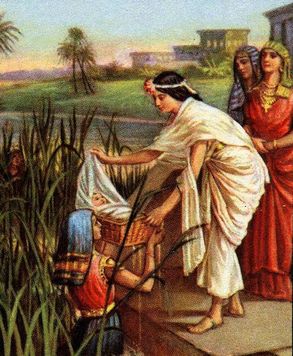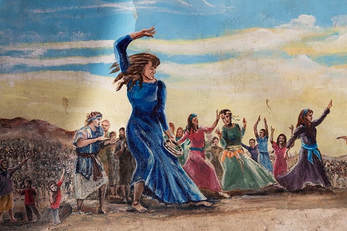
The English word prophet in the Old Testament comes from the Hebrew word “nabiy” which means “spokesman” or “speaker”. The Greek word for prophet is “prophētēs”, which can mean “one who speaks forth” or “advocate.” Prophets are also called “seers,” because of their spiritual insight or their ability to “see” the future, as directed by God.
Miriam
Miriam was he oldest child of Amram and Jochebed the parents of Aaron and Moses.
Exodus 6:20 (NKJV)20 Now Amram took for himself Jochebed, his father's sister, as wife; and she bore him Aaron and Moses. And the years of the life of Amram were one hundred and thirty-seven.
Miriam is very important in the history of Israel and Christianity because she is most likely the sister who who watches over her baby brother Moses when he put in a basket and along the Nile in an effort to save his life. Pharaoh's daughter found him and Miriam, who was watching the whole thing, convinced Pharaoh's daughter to let her go find a Hebrew woman to nurse the baby.
Exodus 2:2-7 (NKJV)2 So the woman conceived and bore a son. And when she saw that he was a beautiful child, she hid him three months.3 But when she could no longer hide him, she took an ark of bulrushes for him, daubed it with asphalt and pitch, put the child in it, and laid it in the reeds by the river's bank.4 And his sister stood afar off, to know what would be done to him.5 Then the daughter of Pharaoh came down to bathe at the river. And her maidens walked along the riverside; and when she saw the ark among the reeds, she sent her maid to get it.6 And when she had opened it, she saw the child, and behold, the baby wept. So she had compassion on him, and said, "This is one of the Hebrews' children."7 Then his sister said to Pharaoh's daughter, "Shall I go and call a nurse for you from the Hebrew women, that she may nurse the child for you?"
Miriam went and got Jochebed, Moses mother.
Exodus 2:8-10 (NKJV)8 And Pharaoh's daughter said to her, "Go." So the maiden went and called the child's mother.9 Then Pharaoh's daughter said to her, "Take this child away and nurse him for me, and I will give you your wages." So the woman took the child and nursed him.10 And the child grew, and she brought him to Pharaoh's daughter, and he became her son. So she called his name Moses, saying, "Because I drew him out of the water."
When Moses was an adult he had to flee Egypt, but many years later was commissioned by God to go back and free the Hebrew people from slavery in Egypt.
Exodus 2:14-15 (NKJV)14 Then he said, "Who made you a prince and a judge over us? Do you intend to kill me as you killed the Egyptian?" So Moses feared and said, "Surely this thing is known!"15 When Pharaoh heard of this matter, he sought to kill Moses. But Moses fled from the face of Pharaoh and dwelt in the land of Midian; and he sat down by a well.
Exodus 3:10 (NKJV)10 Come now, therefore, and I will send you to Pharaoh that you may bring My people, the children of Israel, out of Egypt."

God uses Miriam and her brothers Aaron and Moses, with Moses being the one in command, to lead the people of Israel from slavery in Egypt to the Promised Land in Canaan.
Micah 6:4 (NKJV)4 For I brought you up from the land of Egypt, I redeemed you from the house of bondage; And I sent before you Moses, Aaron, and Miriam.
The Bible identifies Miriam as a prophetess and a songwriter after the miracle at the Red Sea.
Exodus 15:19-21 (NKJV)19 For the horses of Pharaoh went with his chariots and his horsemen into the sea, and the LORD brought back the waters of the sea upon them. But the children of Israel went on dry land in the midst of the sea.20 Then Miriam the prophetess, the sister of Aaron, took the timbrel in her hand; and all the women went out after her with timbrels and with dances.21 And Miriam answered them: "Sing to the LORD, For He has triumphed gloriously! The horse and its rider He has thrown into the sea!" (emphasis mine)
Miriam's Jealousy
Although Miriam was a prophetess she , along with her brother Aaron, did succumb to complaining and jealousy. They first criticized Moses for marrying a Cushite or Ethiopian woman.
Numbers 12:1-3 (NKJV)1 Then Miriam and Aaron spoke against Moses because of the Ethiopian woman whom he had married; for he had married an Ethiopian woman.
2 So they said, "Has the LORD indeed spoken only through Moses? Has He not spoken through us also?" And the LORD heard it.3 (Now the man Moses was very humble, more than all men who were on the face of the earth.)
They were really questioning God’s authority in making Moses the leader, and He was upset by it, and He called them out on it.
Numbers 12:4-10 (NKJV)4 Suddenly the LORD said to Moses, Aaron, and Miriam, Come out, you three, to the tabernacle of meeting!" So the three came out.5 Then the LORD came down in the pillar of cloud and stood in the door of the tabernacle, and called Aaron and Miriam. And they both went forward.6 Then He said, "Hear now My words: "If there is a prophet among you, I, the LORD, make Myself known to him in a vision; I speak to him in a dream.7 Not so with My servant Moses; He is faithful in all My house.8 I speak with him face to face, Even plainly, and not in dark sayings; And he sees the form of the LORD. Why then were you not afraid To speak against My servant Moses?"9 So the anger of the LORD was aroused against them, and He departed.10 And when the cloud departed from above the tabernacle, suddenly Miriam became leprous, as white as snow. Then Aaron turned toward Miriam, and there she was, a leper.
Moses intercedes for his sister and God healed her of lepersy.
Numbers 12:13-16 (NKJV)13 So Moses cried out to the LORD, saying, "Please heal her, O God, I pray!"14 Then the LORD said to Moses, "If her father had but spit in her face, would she not be shamed seven days? Let her be shut out of the camp seven days, and afterward she may be received again."15 So Miriam was shut out of the camp seven days, and the people did not journey till Miriam was brought in again.16 And afterward the people moved from Hazeroth and camped in the Wilderness of Paran.
Neither Moses, Aaron, or Moses, the ones chosen by God to lead the freed slaves, now a nation, to the Promised Land of Canaan, actually entered Canaan.
Numbers 20:1 (NKJV)1 Then the children of Israel, the whole congregation, came into the Wilderness of Zin in the first month, and the people stayed in Kadesh; and Miriam died there and was buried there.
Numbers 20:24-28 (NKJV)24 "Aaron shall be gathered to his people, for he shall not enter the land which I have given to the children of Israel, because you rebelled against My word at the water of Meribah.25 Take Aaron and Eleazar his son, and bring them up to Mount Hor;26 and strip Aaron of his garments and put them on Eleazar his son; for Aaron shall be gathered to his people and die there."27 So Moses did just as the LORD commanded, and they went up to Mount Hor in the sight of all the congregation.28 Moses stripped Aaron of his garments and put them on Eleazar his son; and Aaron died there on the top of the mountain. Then Moses and Eleazar came down from the mountain.
Deuteronomy 34:4-7 (NKJV)4 Then the LORD said to him, "This is the land of which I swore to give Abraham, Isaac, and Jacob, saying, 'I will give it to your descendants.' I have caused you to see it with your eyes, but you shall not cross over there."5 So Moses the servant of the LORD died there in the land of Moab, according to the word of the LORD.6 And He buried him in a valley in the land of Moab, opposite Beth Peor; but no one knows his grave to this day.7 Moses was one hundred and twenty years old when he died. His eyes were not dim nor his natural vigor diminished.
What Can We Learn From Miriam
Miriam was a very influential and important person in God’s plan for the redemption and restoration of mankind. Starting with protecting His chosen deliver, Moses, of the descendants of Abraham, and continuing as a prophetess and leader along with Aaron and Moses, after the deliverance from slavery and the journey to the Promised Land. However as we see, with Miriam, when anybody sins through disobedience, they are subject to discipline and the consequences of their sin.
Miriam’s sin was being discontented with her position of leadership. She wanted equal power with Moses. The thing we can learn from the life of Miriam is to be content wherever God has placed us.
Philippians 4:10-13 (NKJV)10 But I rejoiced in the Lord greatly that now at last your care for me has flourished again; though you surely did care, but you lacked opportunity.11 Not that I speak in regard to need, for I have learned in whatever state I am, to be content:12 I know how to be abased, and I know how to abound. Everywhere and in all things I have learned both to be full and to be hungry, both to abound and to suffer need.13 I can do all things through Christ who strengthens me.

 RSS Feed
RSS Feed